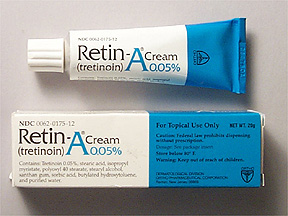Unfortunately, the aging process is something that we all have to deal with at some point in our lives. There are multitudes of creams and serums readily available that claim to assist in slowing this process. Two of the most common (and some of the best recommended) products are retinol and Retin-A products.
Spring is the best time of year to start a retinol/Retin-A regimen. Since these products tend to be drying to the skin, the moisture in the air at springtime helps to keep the dryness at bay.
 Retin-A and retinol products are some of the best weapons to keep in your skincare arsenal. Upon viewing the skin of longtime, consistent Retin-A/retinol users and the skin of those who have not used the products, there is a very apparent difference.
Retin-A and retinol products are some of the best weapons to keep in your skincare arsenal. Upon viewing the skin of longtime, consistent Retin-A/retinol users and the skin of those who have not used the products, there is a very apparent difference.
So, what is the difference between the two?
- Retinol products are the ones that are readily available over-the-counter. Generally, making them more cost effective and easily accessible.
- Retin-A products (or, generically, “tretinoin” products), are the ones you have to venture to the doctor to get – they normally require a prescription. That being said, the visit to the medical professional might be worth it, as they have been boasted as being around 100 times stronger than retinol products.
Both of these products help to treat a bevy of skin concerns. They even out tone and texture. They can improve areas of darkened skin pigment. Perhaps, most importantly, they reduce and prevent the appearance of fine lines associated with the aging process*.
One of the other, larger differences between these products is what causes them to be effective:
- When retinol products are applied to the skin, they combine with enzymes in the skin to create
retinoic acid. This acid is actually what does the trick. The retinol itself does not. - Retin-A does not need anything else, it is the ingredient that treats and helps prevent the aging process. This is one of the reasons why it is more efficient and effective than retinol products.
No matter which you choose, either of these products are invaluable assets to your skincare regimen. For the most part, they are best applied at night, after washing/drying your face.
As is the case with almost anything, these products do not come without a few downsides. Firstly, as mentioned before, they are drying. If you experience skin irritation/dryness after using these products, just take a little break, and perhaps consider applying every other night, as opposed to every night.
Another very important thing to note is that these products can make your skin more vulnerable to the sun. If you are a sun worshipper and start to use retinol products, or Retin-A, please invest in a quality sunblock (think SPF 45 or higher).
If you are interested in Retin-A or a retinol recommendation, you are encouraged to bring it up at your next appointment with Dr. Evan Zelinger. We have a Retin-A product (called “Refissa”, it is tretinoin cream), readily available in the office. We recommend these products to almost any patient of any age! Contact us today to get started!

